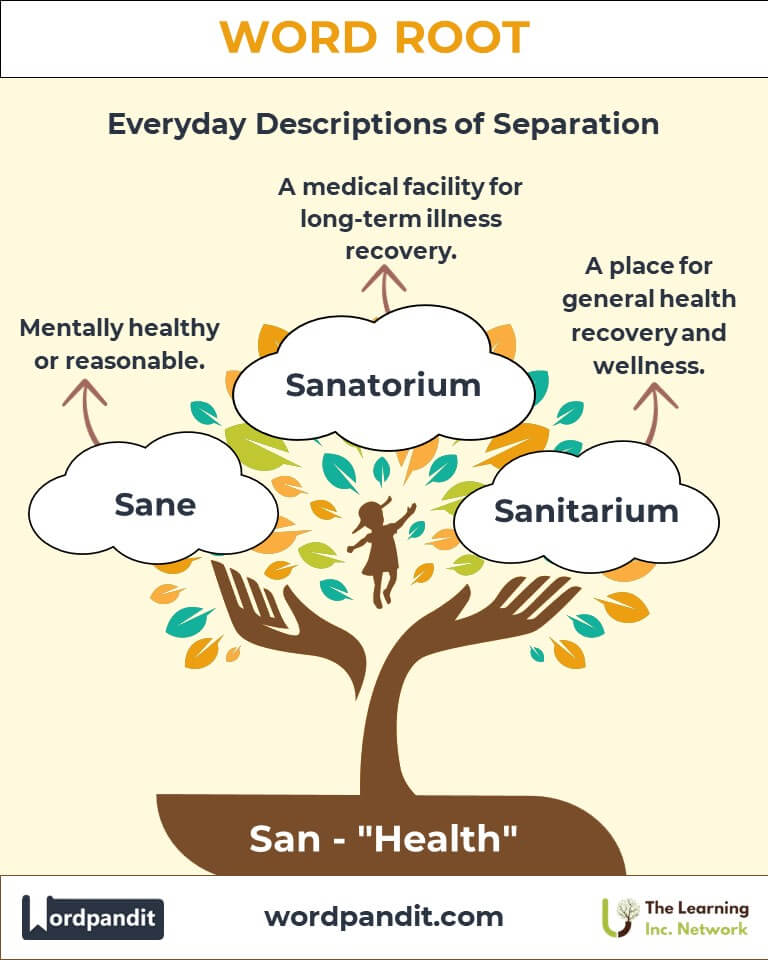San: The Root of Health in Language and Society
Byline: Discover the significance of the Latin root "san," meaning health. From the everyday importance of sanitary conditions to the historical refuge of sanatoriums, this root underscores humanity's enduring commitment to wellness and hygiene.

Table of Contents
- Introduction: The Essence of "San"
- Etymology and Historical Journey
- Mnemonic: Unlocking the Power of "San"
- Common "San"-Related Terms
- "San" Through Time
- "San" in Specialized Fields
- Illustrative Story: "San" in Action
- Cultural Significance of "San"
- The "San" Family Tree
- FAQs About the "San" Word Root
- Test Your Knowledge: "San" Word Root Quiz
- Conclusion: The Living Legacy of "San"
1. Introduction: The Essence of "San"
When we think of health, words like "sanitary" and "sanatorium" often come to mind, emphasizing cleanliness and healing. The root "san", derived from Latin, means health. Pronounced as "san" (rhyming with "man"), this root has influenced terms across hygiene, medicine, and societal well-being. Its relevance spans centuries, reflecting the universal importance of health in human life.

2. Etymology and Historical Journey
The root "san" originates from the Latin word sanus, meaning healthy, sound, or whole. Early Roman practices emphasized personal hygiene and public sanitation, showcasing the root's practical origins. Over time, "san" evolved to describe institutions like sanatoriums, which provided spaces for recovery from illness, especially during the 19th and early 20th centuries when tuberculosis was rampant.
3. Mnemonic: Unlocking the Power of "San"
To remember the root "san," picture a clean, shining hospital room, symbolizing health and hygiene.
Mnemonic Device: "San safeguards soundness—cleanliness is the key to health!"
4. Common "San"-Related Terms
-
Sanitary (san-i-tair-ee): Related to cleanliness or conditions that promote health.
Example: "The restaurant follows strict sanitary guidelines to ensure food safety." -
Sanatorium (san-uh-toh-ree-um): A medical facility for long-term illness recovery, often in a peaceful setting.
Example: "The mountain sanatorium offered patients fresh air and tranquility." -
Sanitation (san-i-tay-shun): Systems and practices for maintaining cleanliness and preventing disease.
Example: "Proper sanitation reduces the spread of infectious diseases." -
Sane (sayn): Mentally healthy or reasonable.
Example: "After a hectic week, a quiet weekend helped her feel sane again." -
Sanitize (san-i-tize): To make clean and free from harmful microorganisms.
Example: "Healthcare workers sanitize their hands frequently to prevent infection."
5. "San" Through Time
- Sanatorium: Once central to tuberculosis treatment, sanatoriums in the 19th century symbolized hope for recovery in an era before antibiotics.
- Sanitary: The term gained prominence during the Industrial Revolution when urbanization demanded better public health measures.
6. "San" in Specialized Fields
- Medicine: Sanatorium: These facilities were precursors to modern hospitals for long-term care.
- Public Health: Sanitation: Critical for managing waste and preventing epidemics.
- Psychology: Sane: Highlights mental well-being, linking physical health with emotional balance.
7. Illustrative Story: "San" in Action
Maria was a public health officer in a bustling city. One day, an outbreak of illness spread through her community. She spearheaded efforts to improve sanitation, ensuring clean water and waste disposal systems. Her actions, inspired by the principles of "san," restored health and safety to her city. Meanwhile, in a distant town, her brother, recovering in a tranquil sanatorium, wrote letters expressing gratitude for the calm environment aiding his recovery.
8. Cultural Significance of "San"
The root "san" highlights humanity's ongoing focus on health and hygiene. From ancient Roman aqueducts to modern-day hospitals, "san" symbolizes the universal pursuit of wellness. Public campaigns promoting sanitary practices have played critical roles in improving global health standards.

9. The "San" Family Tree
- Sanus (Latin: Health):
- Sanctuary: A place of safety and protection.
- Sanct (Latin: Holy, sound):
- Sanctify: To make holy or clean.
- Sanit (Latin: Health):
- Sanitarium: Another term for a healing facility.

10. FAQs About " San"
Q: What does the root "san" mean?
A: "San" means health or soundness, originating from the Latin sanus. It reflects concepts of physical, mental, and even environmental well-being, underscoring the importance of maintaining cleanliness, hygiene, and balance in life.
Q: How do "sanitarium" and "sanatorium" differ?
A: Both terms stem from "san," but they have nuanced differences. A sanitarium generally refers to a place for general health recovery, often associated with rest and wellness. In contrast, a sanatorium historically referred to institutions focused on treating chronic diseases like tuberculosis, especially during the pre-antibiotic era.
Q: Why is "sanitation" important in modern society?
A: Sanitation encompasses systems and practices that ensure cleanliness and prevent disease transmission. Examples include safe water supply, effective waste management, and hygienic public spaces. These measures are vital for public health and have drastically reduced mortality rates from infectious diseases.
Q: What does "sanitary" mean in daily life?
A: "Sanitary" describes conditions that promote cleanliness and health. It can refer to personal hygiene, clean environments (such as kitchens and bathrooms), or practices that prevent contamination, such as sterilizing medical equipment.
Q: Why is mental health linked to "san"?
A: The term "sane" (from sanus) connects mental well-being with the idea of being sound or balanced. Historically, good mental health was seen as an extension of physical health, and "san" reflects this holistic view of well-being.
Q: What is the role of sanatoriums in medical history?
A: Sanatoriums were pivotal in the treatment of chronic illnesses, especially tuberculosis, before the advent of antibiotics. These facilities provided fresh air, rest, and specialized care, helping patients recover in peaceful and health-promoting environments.
Q: How has the concept of "san" evolved over time?
A: Initially focused on personal and public hygiene in ancient Rome, "san" expanded to include mental health (sane), environmental cleanliness (sanitation), and institutions for recovery (sanatoriums). Today, it continues to highlight the universal importance of health in various contexts.
11. Test Your Knowledge: “San” Mastery Quiz
1. What does the root "san" signify?
2. Which term describes practices ensuring cleanliness?
3. What was the primary use of a sanatorium?
4. What does "sanitary" mean?
5. What does "sanitize" involve?
12. Conclusion: The Living Legacy of "San"
The root "san" serves as a testament to humanity's enduring commitment to health and well-being. From ancient sanitation systems to modern medical facilities, "san" is a linguistic and cultural cornerstone that promotes both individual and societal wellness. As we continue to prioritize health in all forms, the legacy of "san" reminds us that a healthy foundation is essential for a thriving future.












